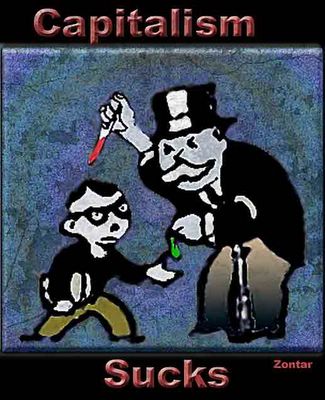
"Why must possession be piled upon possession, the latest soon losing its charm and needing a replacement? Why do I need a second house or a first car? Who will clean it if I have a living room big enough for 50 to party? Why can't I recycle my college textbooks, unread in 35 years? Have I so thoroughly identified with my own junk? It is as if I feared the memory would vanish without the memento." - GreenSmile
The spiritual mistake at the core of materialism is that it is based on the concept that there is an internal self, or "me," separate from the external "everything else," that is capable of acquiring "stuff." This duality between self and not-self allows us to believe that our stuff is "mine," and not "theirs," and even more broadly that I am "me" and my stuff is "not me," but something possessed by "me." Animals in particular suffer from the last part of that delusion.
But who is the self acquiring this "stuff?" Upon close inspection, if we really search our mind, no real self can ever be found.
Is the self the body? Hah, that's a laugh. The body changes and grows old, it gains and sometimes loses mass, it takes in nutrients and shits out excrement - it's in a constant state of flux, and there's no persistent entity to the "body." If my brain were transplanted into another body, which would be my "self" - the old body or the new body?
Is the self thought? I think, therefore, am I? Well, thoughts change all of the time, I get new thoughts from reading or talking to others - whose thoughts are those? And who's the one thinking? Am I no longer my self when I'm not thinking?
Is the self memory? Is that why we cling to mementos and nostalgia? Memories change as much as thoughts - new ones are constantly added and old ones vanish into . . . well . . .um, what was the question again? Are amnesiacs no longer their selves?
Is the self emotion and impulse? My moods seem to change more than my opinions or memories - how can something so insubstantial as emotion be my self? Plus, emotions are as contagious as the flu - if you make me laugh, am I now you? If I make you cry, are you now me?
So the self must be consciousness, right? "I" must be the one who is aware of my "self." "I" must be the one who perceives all of these senses. Right? But on deepest reflection, one realizes that all consciousness is, in fact, conscious of something. Without an external "thing" to perceive, such as something to see, hear, smell, touch, taste or even think about, there is no consciousness. So where is the consciousness, in the perceiver or in the perceived? It is merely the interface between the two. If we identify with our consciousness, we must include everything of which we are conscious in our definition of "self."
So, in fact, on direct observation, there is no "self" that can be found. A radical idea, but something the Buddha taught 2,500 years ago.
Yet, still we delude ourselves that we alone are separate from everything else, and then that we can possess "stuff," and in fact must possess it before someone "other" does. And this of course leads to materialism and to competition and to war and to the whole spectrum of human suffering.

1 comment:
Shokai, why the cartoon on capitalism? This post is not about capitalism, it is about materialism in both senses, i.e. In the sense that physical comfort is more important than spiritual values, and in the philosophical sense that nothing exists except matter and its movements and modifications (the "self" doesn't exist because it isn't matter)
But Shokai, capitalism has nothing to do with any of this or with any position in your essay. Capitalism is an outcome. It is not a system. It is not a social arrangement. It is not a belief. If you own capital, in any of its forms, you are a capitalist. You are a capitalist in the sense that it is the consequence of owning capital. If the marketplace is open and free, if the sole purpose of government is to protect and maintain that openness and freedom, and if the agents and agencies who make up the open marketplace are allowed by the powers that be to keep what they have earned through open and mutual agreement among themselves, then the greatest possible number of the people can 1) engage in those transactions, and 2) become capitalist.
In other words, capitalism is the outcome or the consequence of an open, unrestricted marketplace. That the greatest number of people end up becoming capitalist is the outcome. Capitalism is what we call that outcome. It is the word we use to describe the outcome of a free and open marketplace. Contrariwise, serfdom is the consequence of the opposite.
Post a Comment